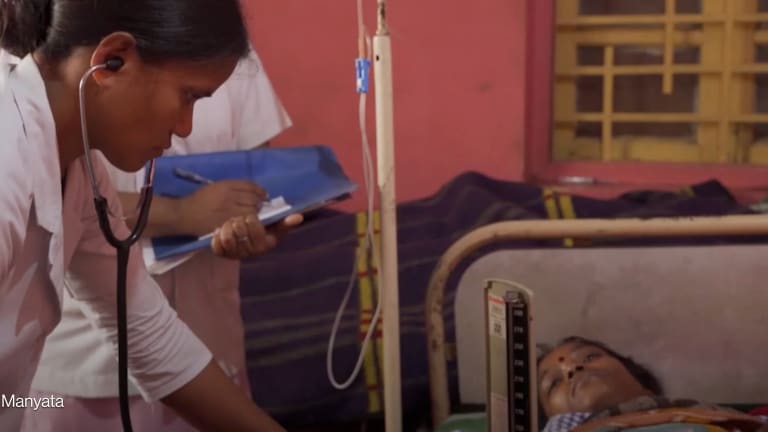Opinion: Deploying blended financing to advance the SDGs for health

Although there has been great progress in improving health in lower-income countries, many remain far from achieving the United Nations’ Sustainable Development Goals of ensuring healthy lives and achieving universal health coverage. Given the realities of consistently strapped national budgets, declining development aid, and fragmented donor grants, it is critical to pursue alternative financing mechanisms to meet countries’ extensive health care needs. Private investment — which has contributed to growth in other sectors — is important to explore in strengthening health care.
The estimated annual investment necessary to meet the health-related SDGs in low- and middle-income countries is projected to increase to $371 billion by 2030 — $103.6 billion alone is required to meet SDG 3.1, which calls for ending preventable maternal deaths. According to the Center for Innovation and Impact at the U.S. Agency for International Development , there is $200 trillion available in global private capital markets. Directing even a small fraction of these assets toward health could fill the funding gap to meet the SDGs, dwarfing all other sources of funding.
Public-private financing partnership to improve health
The Maternal Outcomes Matter, or MOMs, initiative was launched in 2019 to increase access to financing for private health businesses in sub-Saharan Africa and India seeking to address unmet health care needs, meet consumer demand, and expand services. The initiative aims to improve maternal health and reduce high rates of women dying from complications of pregnancy and childbirth.
The MOMs initiative is a $50 million public-private collaboration between MSD for Mothers and the U.S. International Development Finance Corporation , with USAID providing technical assistance. The partners are using blended finance — a mix of equity, debt financing, and grant capital — to help health entrepreneurs transition from grant-funded startups to scalable and sustainable businesses.
The blended financing structure provides entrepreneurs with sufficient financial capacity to innovate, test, and optimize their business strategies to identify and address unmet health care needs; foster equitable health impact and population reach; and catalyze financial and business growth to scale access to health care services across local communities.
Private investment in small- and medium-sized enterprises can have a multiplier effect because it stimulates innovation and efficiency in delivering health services — leading to better health — and strengthens local businesses, which are the economic backbone in many lower-income communities.
Private financing in action: Reaching more health care customers at the ‘last mile’
An early recipient of financing through the MOMs initiative is Kasha, a last-mile delivery platform to help communities in sub-Saharan Africa access household goods and health care products. Kasha’s primary market is approximately 50% of the population residing in rural and peri-urban areas who lack reliable access to essential health products and services.
Kasha initially launched in Rwanda and scaled its business to multiple counties in Kenya with a focus on addressing women’s maternal health needs. With blended grant and equity financing from the MOMs initiative, Kasha conducted consumer research and strategic business planning that enabled the company to understand communities’ health needs better, broaden its geographic footprint, and meet women’s health care needs more holistically.
Scaling business impact and reach across Kenya and Rwanda
With grant funding from MSD for Mothers and $1 million in equity financing from DFC, Kasha diversified its services and tripled its product offerings to customers, including virtual education services to support women’s health and well-being before, during, and after pregnancy. Enhancing its business strategy to be more consumer-centered has enabled Kasha to increase its reach by 90% in Kenya and Rwanda, offering more women access to a broader supply of essential maternal health products and information that address critical unmet needs. Kasha also expanded its agent network in rural areas and informal settlements — providing more employment opportunities — and established partnerships to reach the most marginalized communities.
Financing and technical assistance from the MOMs initiative helped Kasha identify strategic opportunities to strengthen its business model, including deepening relationships with multiple global pharmaceutical companies. As a result, Kasha no longer relies on third-party distributors to acquire its health care products, enabling the company to maintain affordable prices and guarantee the quality of its products.
After the success of MOMs’ initial investment, DFC made an additional $3 million equity investment in 2023 to support the continued scale of Kasha’s health service platform in South Africa.
Kasha is committed to expanding its services to additional health areas with great unmet needs, such as diabetes, HIV/AIDS, and other chronic diseases. The company plans to invest in data systems to ensure the availability and timely delivery of products and pilot supply chain models that are more sustainable and responsive to its customers. Kasha is also extending its operations across Africa to serve more people and meet their health care demands. Since partnering with MOMs in 2021, Kasha has initiated business operations in the Democratic Republic of Congo, Burundi, Uganda, Tanzania, South Africa, and Ghana.
Lessons learned: Equitably and sustainably financing entrepreneurs in LMICs
Kasha is one of 11 health businesses participating in the MOMs initiative. Others include a blood bank, a primary health clinic network, a medical equipment and supplies vendor, a quality care improvement and accreditation fund, and a digital health promotion platform for pregnant women and community health workers.
Kasha’s success demonstrates the impact of mobilizing private capital to support health businesses. The following lessons learned can inform similar investments designed to address local health challenges at scale:
• Community-based innovators are often best placed to respond to local unmet health care needs.
• Financing local health businesses fosters economic growth and can help low-income countries transition from dependency on development aid.
• Understanding unmet consumer needs and health market failures may be a critical initial step toward defining a business’s value proposition and a path toward scale.
• Meet entrepreneurs where they are financially and embrace a phased investment approach when necessary — beginning with grant funding to validate a business strategy and de-risk large-scale debt or equity financing.
Other innovative financing initiatives offer similar universal learnings. Investing in Innovation, or I3, is supporting promising startups in Africa to increasingly strengthen supply chains and distribute medical commodities for greater access to essential medicines and health products, at scale, across communities.
The opportunity for innovation in the local private health sector is enormous, especially in lower-income markets. Financing should not be a barrier for local entrepreneurs who are looking to scale their health solutions. Investing in entrepreneurs who are committed to greater and more equitable access to health care has the potential to accelerate improvements in health around the world, especially as the 2030 deadline for the SDGs quickly approaches.
The Funding the Future series is supported by funding from MSD, through its MSD for Mothers program, and is the sole responsibility of the authors. MSD for Mothers is an initiative of Merck & Co. Inc., in Kenilworth, N.J., U.S.
Join the conversation on finding private sector solutions to improve health service delivery for reproductive, maternal, newborn, child, and adolescent health (RMNCAH).

Search for articles
Most Read
- 1
- 2
- 3
- 4
- 5










